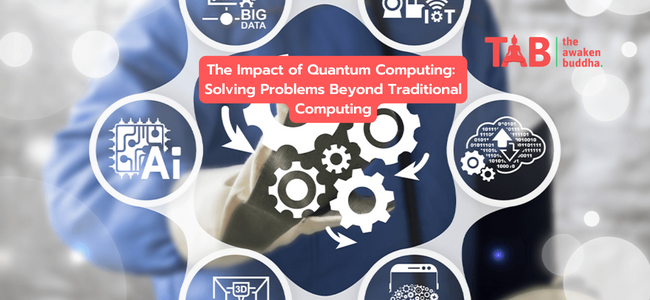Introduction
The concept of quantum computing is rather new, yet it is revolutionizing how we solve problems in almost every technology field. Quantum computing uses quantum bits, also known as qubits, to process and store data. Unlike classical computing, which uses bits to represent information, quantum computing allows data to be simultaneously in multiple states. This enables quantum computers to perform certain computations exponentially faster than classical computers.
History of Quantum Computing

The idea of quantum computing was first proposed in the 1980s by Richard Feynman, a physicist, and Nobel laureate. Feynman suggested that quantum computers could solve problems that classical computers would find extremely difficult, if not impossible, to solve. However, it wasn’t until the late 1990s that quantum computing began to gain significant attention in the scientific community.
How Quantum Computing Works
Quantum computers use qubits, subatomic particles such as electrons or photons, to store and process data. Unlike classical bits that can only have two states, either 0 or 1, qubits can simultaneously be in a state of both 0 and 1. This property is known as superposition. Quantum computers also rely on entanglement, a phenomenon where two or more qubits can be inextricably linked, allowing for simultaneous computations on multiple qubits.
Applications of Quantum Computing
The impact of quantum computing is already being felt in various industries. For instance, quantum computing can help develop new drugs and treatments by quickly simulating molecular interactions. It can also help optimize logistics by solving complex problems in seconds, such as route optimization or scheduling. Additionally, quantum computing is being explored in artificial intelligence, which can accelerate machine learning algorithms’ training.
Quantum Computing and Cybersecurity

One of the most significant impacts of quantum computing is its potential impact on cybersecurity. As quantum computers become more powerful, they could break traditional encryption methods to secure sensitive information. Therefore, there is a requirement to create new encryption methods that can resist quantum computing attacks.
Challenges and Limitations
Despite the immense potential of quantum computing, there are still significant challenges to be overcome. One of the most important challenges is the issue of error correction. Quantum computers are susceptible to external disturbances, making it difficult to maintain the delicate quantum states of qubits. Additionally, quantum computers are still in their infancy, and there are still limitations to the number of qubits that can be operated in a computation.
Conclusion
Quantum computing can revolutionize how we solve problems in almost every technology field. Its ability to perform certain computations exponentially faster than classical computers has the potential to transform industries and solve problems that were once thought to be unsolvable. While there are still challenges to be overcome, the impact of quantum computing on our future is undeniable.
FAQs
1. What is quantum computing, and how does it work?
Quantum computing is a form of computing that uses qubits to store and process data. Qubits are subatomic particles that can be in a state of both 0 and 1 simultaneously, allowing for computations to be performed exponentially faster than classical computers.
2. What are some applications of quantum computing?
Quantum computing has applications in various industries, including drug discovery, logistics optimization, and artificial intelligence.
3. How does quantum computing impact cybersecurity?
Quantum computing could break traditional encryption methods to secure sensitive information, making it essential to develop new encryption methods to resist quantum computing attacks.
4. What are some challenges and limitations of quantum computing?
One of the most significant challenges of quantum computing is error correction, as quantum computers are susceptible to external disturbances. Additionally, the number of qubits that can be used in the computation is still limited, and quantum computers are still in their infancy.
5. How is quantum computing different from classical computing?
Quantum computing uses qubits in multiple states simultaneously, while classical computing uses bits that can only be in one state at a time. This property permits quantum computers to perform certain computations faster than classical computers.










